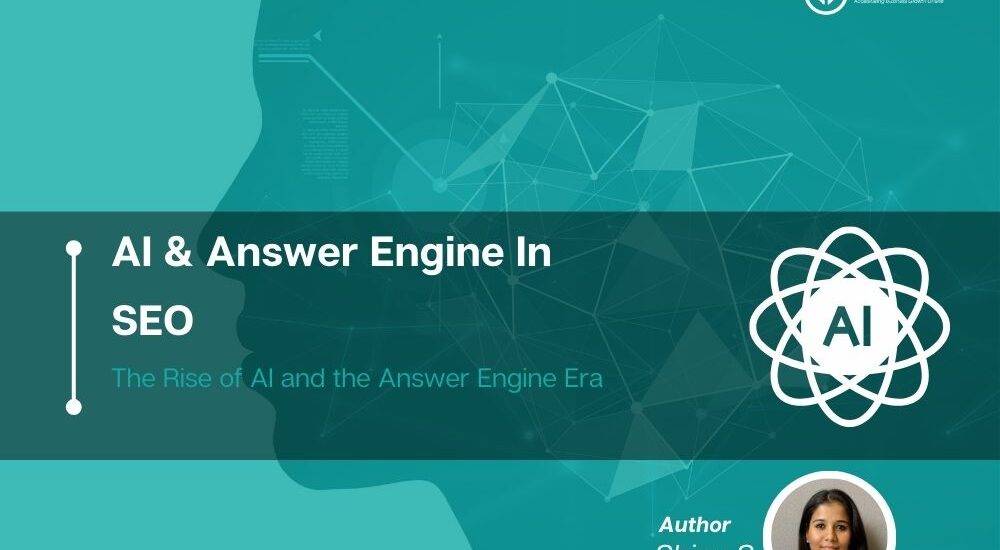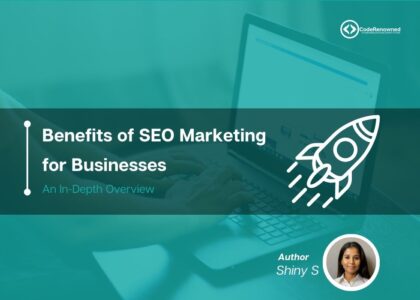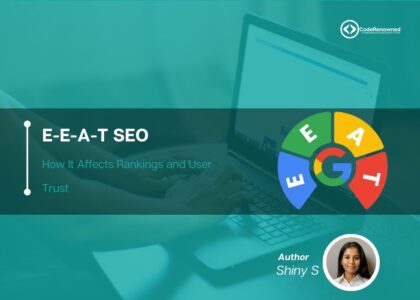AI & Answer Engine In SEO
The Rise of AI and the Answer Engine Era

Search Engine Optimization (SEO) has always been a strategy to increase online visibility and drive organic traffic. In 2024, SEO is undergoing an extensive transformation by advancements in Artificial Intelligence (AI) and the emergence of the Answer Engine era. Below, Let’s delve into the key trends, challenges, and strategies that define SEO in 2024, exploring how AI technologies are reshaping businesses to optimize their online presence and meet the evolving demands of users and search engines.
The Evolution of Search Engines: From Keywords to Answers
Search engines have undergone a pattern shift in their approach to serving user queries over decades. Typically, Search engines lean heavily on keyword-matching algorithms to regain relevant results.
With the birth of AI and natural language processing (NLP), search engines have become experts at understanding the context and intent behind user queries. These led to the rise of Answer Engines – search engines that prioritize delivering direct answers to user questions.
Google’s Featured Snippets, Knowledge Graph, and Bing’s Answer Boxes are prime examples of Answer Engine that have revolutionized users’ interaction with search results.
Instead of providing a list of links, they extract and display straightforward answers directly within the search results, preventing the need for users to click on individual websites.
The Role of AI in SEO
AI technologies have an extensive influence in shaping the SEO outlook. AI-powered algorithms, like Google’s RankBrain and BERT (Bidirectional Encoder Representations from Transformers), understand user queries, explain the context, and rank content based on relevance and quality.
The meaningful impact of AI on SEO is the change towards semantic search optimization. Semantic search goes beyond keyword matching to understand the meaning and intent behind user queries for search engines to deliver more accurate and contextually relevant results, making SEO professionals increasingly focused on creating high-quality, complete content that addresses user questions.
AI-powered content generation is where SEO is experiencing a pattern shift. Advanced natural language generation (NLG) algorithms can produce human-like content, enabling businesses to automate content creation by maintaining quality and relevance.
From product descriptions to blog posts, AI-generated content is becoming increasingly dominant in SEO, offering new opportunities and challenges for marketers.
Voice Search and Conversational SEO
The increase of voice-enabled devices and virtual assistants has led to a wave in voice search queries, instigating SEO professionals to adapt strategies to this growing trend. Voice search optimization involves optimizing content for natural language queries and conversational interactions, opposing traditional keyword-based searches.
Long-tail keywords, question-based queries, and informal language are note components of conversational SEO. Optimizing for local search and providing brief, direct answers to commonly asked questions helps websites capitalize on the rising popularity of voice search and secure desired positions in Answer Engine.
Personalization and User Experience
In the AI-driven SEO Era, User experience (UX) and personalization have become crucial ranking factors. Search engines prefer websites that deliver seamless user experiences tailored to individual preferences and behaviors. Website speed, mobile-friendliness, accessibility, and stay time observed by search engine algorithms for rankings.
Personalized search results based on search history, location, and demographic information highlight the importance of unique needs and preferences.
SEO professionals must create engaging, user-centric experiences that resonate with their target audience and encourage interaction and exploration.
The Rise of Visual and Video Content
Visual and video content continues to dominate the digital world by engaging and immersive experiences for users. From images and infographics to videos and animations, multimedia content captures attention and conveys information effectively.
In SEO, optimizing visual and video content involves more than just adding alt text and descriptive tags. Marketers must utilize AI-powered image recognition and video analysis tools to enhance discoverability and relevance. Techniques like image optimization, video transcript creation, and implementing Schema markup help search engines understand and index multimedia content more effectively by improving its visibility in search results.
Local SEO and Geotargeting
Businesses targeting local markets, local SEO, and geotargeting have indispensable strategies for maximizing online visibility and driving foot traffic to physical locations. With the rise of mobile search and location-based services, consumers mostly rely on search engines to find nearby businesses and services.
Optimizing Google My Business listings, developing local citations, and incorporating location-specific keywords are essential for improving local search rankings. Businesses can utilize AI-driven geotargeting techniques to deliver personalized content and promotions based on users’ geographic locations, enhancing relevance and engagement.
Ethical and Sustainable SEO Practices
AI algorithms become more refined at detecting and penalizing black hat SEO tactics, and ethical and sustainable SEO practices have never been more mandatory. Search engines prefer websites that provide genuine value to users through high-quality content, classic backlinks, and positive user experiences.
SEO professionals must stick to ethical guidelines and best practices to maintain long-term credibility and rankings from content creation to link building. Transparency, integrity, and a focus on user satisfaction should be the guiding principles of the SEO strategy, ensuring that businesses succeed in the short term and thrive in the ever-evolving digital Year of 2024 and beyond.
Conclusion:
SEO in 2024 is the rise of AI and the emergence of the Answer Engine era, where search engines prefer delivering direct answers to user queries. From semantic search optimization to conversational SEO, personalization, and ethical practices, businesses must adapt their SEO strategies to the evolving demands of users and search engines.
By Using AI technologies, optimizing for user experience, and creating valuable, relevant content, businesses can position themselves for success in the competitive digital marketplace in 2024. As we continue to embrace innovation and technological advancements, one thing remains clear – the future of SEO is AI-driven, user-centric, and full of endless possibilities.






